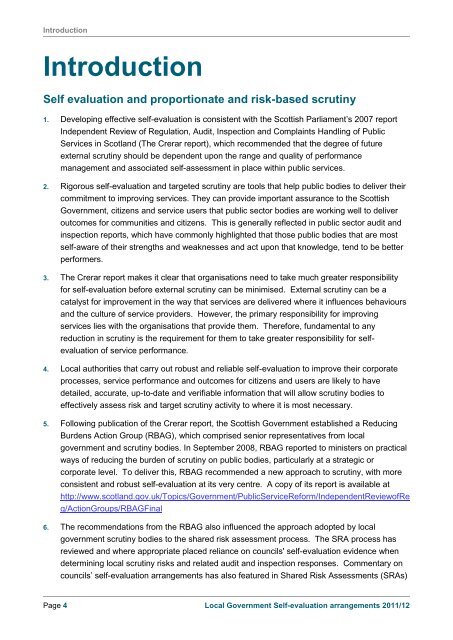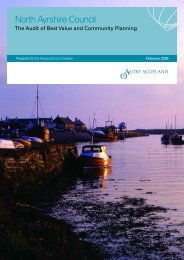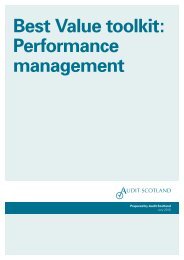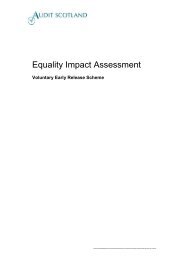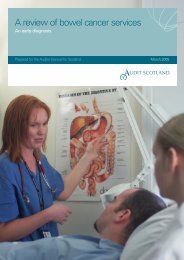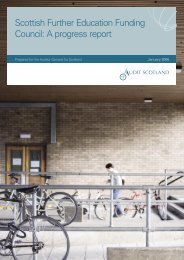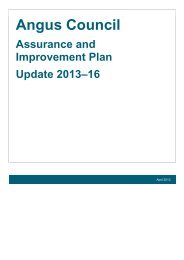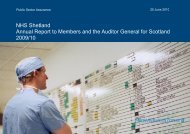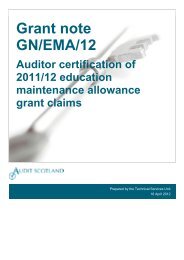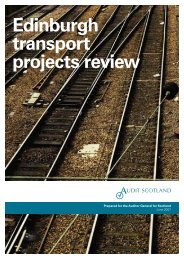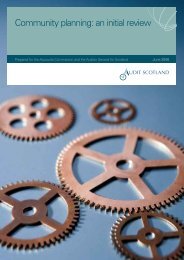Local Government self-evaluation arrangements ... - Audit Scotland
Local Government self-evaluation arrangements ... - Audit Scotland
Local Government self-evaluation arrangements ... - Audit Scotland
Create successful ePaper yourself
Turn your PDF publications into a flip-book with our unique Google optimized e-Paper software.
IntroductionIntroductionSelf <strong>evaluation</strong> and proportionate and risk-based scrutiny1. Developing effective <strong>self</strong>-<strong>evaluation</strong> is consistent with the Scottish Parliament’s 2007 reportIndependent Review of Regulation, <strong>Audit</strong>, Inspection and Complaints Handling of PublicServices in <strong>Scotland</strong> (The Crerar report), which recommended that the degree of futureexternal scrutiny should be dependent upon the range and quality of performancemanagement and associated <strong>self</strong>-assessment in place within public services.2. Rigorous <strong>self</strong>-<strong>evaluation</strong> and targeted scrutiny are tools that help public bodies to deliver theircommitment to improving services. They can provide important assurance to the Scottish<strong>Government</strong>, citizens and service users that public sector bodies are working well to deliveroutcomes for communities and citizens. This is generally reflected in public sector audit andinspection reports, which have commonly highlighted that those public bodies that are most<strong>self</strong>-aware of their strengths and weaknesses and act upon that knowledge, tend to be betterperformers.3. The Crerar report makes it clear that organisations need to take much greater responsibilityfor <strong>self</strong>-<strong>evaluation</strong> before external scrutiny can be minimised. External scrutiny can be acatalyst for improvement in the way that services are delivered where it influences behavioursand the culture of service providers. However, the primary responsibility for improvingservices lies with the organisations that provide them. Therefore, fundamental to anyreduction in scrutiny is the requirement for them to take greater responsibility for <strong>self</strong><strong>evaluation</strong>of service performance.4. <strong>Local</strong> authorities that carry out robust and reliable <strong>self</strong>-<strong>evaluation</strong> to improve their corporateprocesses, service performance and outcomes for citizens and users are likely to havedetailed, accurate, up-to-date and verifiable information that will allow scrutiny bodies toeffectively assess risk and target scrutiny activity to where it is most necessary.5. Following publication of the Crerar report, the Scottish <strong>Government</strong> established a ReducingBurdens Action Group (RBAG), which comprised senior representatives from localgovernment and scrutiny bodies. In September 2008, RBAG reported to ministers on practicalways of reducing the burden of scrutiny on public bodies, particularly at a strategic orcorporate level. To deliver this, RBAG recommended a new approach to scrutiny, with moreconsistent and robust <strong>self</strong>-<strong>evaluation</strong> at its very centre. A copy of its report is available athttp://www.scotland.gov.uk/Topics/<strong>Government</strong>/PublicServiceReform/IndependentReviewofReg/ActionGroups/RBAGFinal6. The recommendations from the RBAG also influenced the approach adopted by localgovernment scrutiny bodies to the shared risk assessment process. The SRA process hasreviewed and where appropriate placed reliance on councils' <strong>self</strong>-<strong>evaluation</strong> evidence whendetermining local scrutiny risks and related audit and inspection responses. Commentary oncouncils’ <strong>self</strong>-<strong>evaluation</strong> <strong>arrangements</strong> has also featured in Shared Risk Assessments (SRAs)Page 4 <strong>Local</strong> <strong>Government</strong> Self-<strong>evaluation</strong> <strong>arrangements</strong> 2011/12


